Sociology research methods are the methodological tools that sociologists use to collect data. Sociologists use research methods in the production of knowledge, but they also use their methods in applied sociology.
In this article we ask some of the top sociologists working in various industries about how they use sociology research methods and what research methods courses students should take. You can view all of the individual interviews on our profiles in applied and clinical sociology page. Though, we have conveniently analyzed all of these responses and summarized the main points to demonstrate the value in sociology research methods
What the Experts Say about Sociology Research Methods
At times throughout our education, many of us have probably found ourselves feeling elitist about the specific research methods we use. Maybe we believe qualitative methods are more important because they provide our work with rich data on experience and processes. Or, maybe we believe our quantitative research methods are superior because they offer replication and generalization.
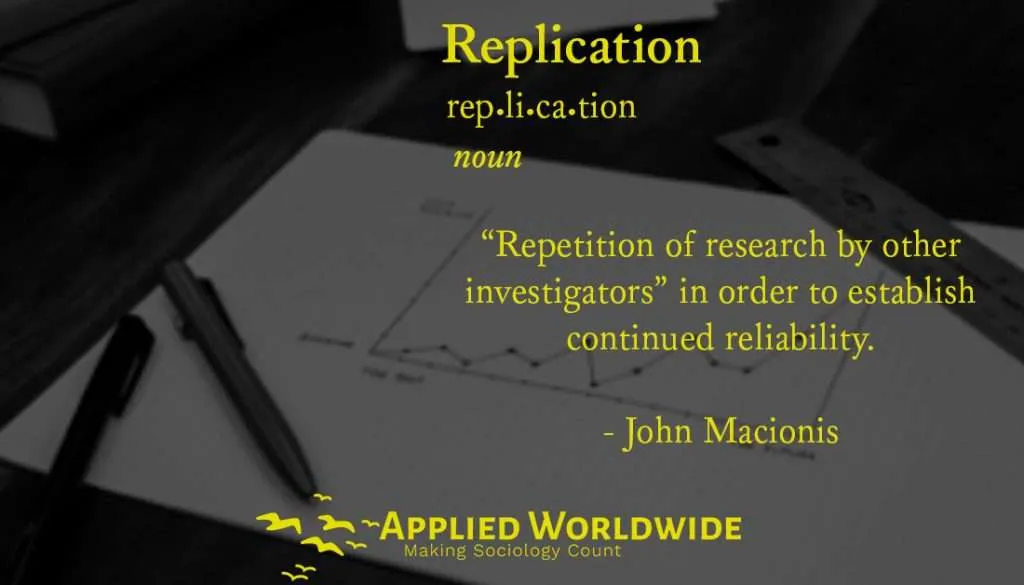
The fact is, as sociologists our research methods are tools and learning to use these tools is a valuable skill. Of course folks looking to become academic professors or researchers need to have expertise in research methods and in many cases they need specialized knowledge about a specific method or group of methods to compete in the publication market. In this article, we want to express how important sociology research methods are beyond academic appointments or publication.
One of Applied Worldwide’s largest and longest running projects is our Profiles in Applied and Clinical Sociology Series. We started this project in 2019 and are continuing to publish profiles of professional sociologists from around the world.
For this project, we conducted open-ended survey interviews with some of the top applied and clinical sociologists working in different industries. In the interviews we asked professionals two questions that relate to the value of sociology research methods.
- How do you use sociological research methods in practice?
- What courses should students take in preparation for a career similar to yours?
How do you use sociology research methods in practice?
Responses to our question of how professionals use research methods in their practice were revealing. How we constructed our survey allowed professionals to select only the questions that applied to their own experiences. Therefore, it is striking that 32 out of our total 38 respondents answered this question. This means that about 84% of the applied sociologists we have interviewed use research methods in their careers. As we reviewed the responses to our question on hw sociologists use research methods, we noticed the major theme of practitioners viewing research methods as tools of their trade.
Overall, we found three major areas where sociologists use their research methods tools:
- Evaluation Research
- Medical Research
- Social Justice Research
Research Methods are Tools
Before we get into the specific uses of sociological tools, lets look at some responses that demonstrate how methods are skills. Megan Nanney uses sociology to improve diversity, equity, and inclusion in higher education. On how they use research methods in their work, Dr. Nanney says,
“Sociological research is at the core of my current position. Because sociological methods give us the tools to systematically study the happenings of our everyday lives, these tools allow me to go beyond merely reporting the numbers of people on campus by various demographics, to tell a story with the data and create actionable solutions. This then moves the conversation from the individual level where students, faculty, and staff are seen as a problem that needs to be managed within the institution, to seeing how these group patterns are a result of structural issues.”
Furthermore, in reference to her background of applied work Gina Finelli notes, “How could one NOT use sociological methodology and theory in practice? This is OUR toolset – and both are necessary in conjunction to collect data, assess needs, and analyze given scenarios to be able to provide recommendations to assist clients.” Once again, we see another sociologist frame research methods as a set of tools to be used in applied careers. Dr. Finelli also mentions the importance of sociological theory, which will we get to below.
Another great example of how we might use research methods as tools comes from Austin Johnson.
“Sociological methods give us the tools to systematically study the goings on of our everyday lives. We are social creatures ourselves, and it is sometimes hard to recognize patterns or grasp experiences that differ from our own. Sociological methods provide us the with tools to place our social experiences in context and in conversation with the range of experiences in our social world.”
In this quote, Dr. Johnson references how sociological methods help us to systematize our experiences. All research is impacted by the researcher own position within society, so it is important to recognize our positionality as researchers. The ability to do so is a skill that comes with practice and training in sociology.
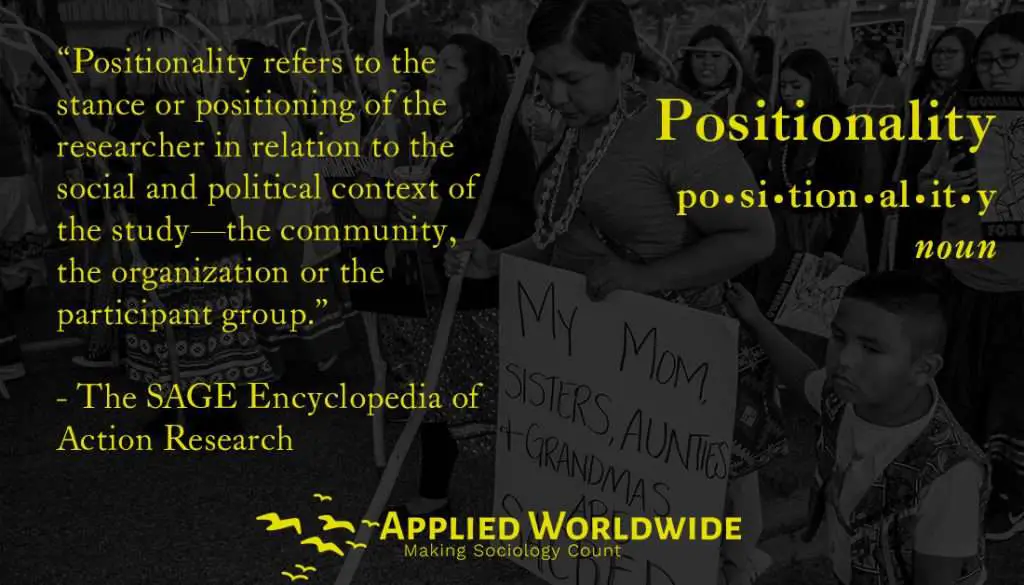
Our final quote on using sociology research methods once again demonstrates how we might use research methods as tools. Raeda Anderson reflects on her sociological background and how it has assisted in interdisciplinary groups.
“I use sociological research methods each day. As a Research Scientist with sociological training, I have a rather diverse training background in data (collection, cleaning, management), survey design (survey, interviews, focus groups), and methods (qual, quant, and mixed) and I can work easily with people from drastically different training backgrounds.”
The major point here is that research methods are tools. When we use these tools appropriately, it can open up professional opportunities where we can use our skills to make positive changes in society. Evaluation, healthcare, and social justice were three specific areas in which many professionals discussed using their research methods skills.
Applied Sociology Research Methods in Evaluation Research
At the start of any project, stakeholders need to establish monitoring and evaluation practices. Monitoring refers to established data check-points during the project that allow stakeholders to know whether the project is on schedule and seemingly meeting intended objectives. Evaluation occurs once a project has been implemented and enough data exists to establish whether the project has achieved its goals well enough. We may also refer to this process as measuring outcomes.
If projects are not meeting their goals then the project manager will need to re-strategize or in some cases scrap the project all-together. Sociologists have established a niche market for their skills in evaluation research. Grace Morris describes this process in reference to her own evaluation work.
“Much of the work I do has to eventually demonstrate impact—sometimes this impact isn’t visible until years later. For me this comes down to weaving data collection throughout a program or service-based interaction in the form of surveys, interviews, and then iteratively pulling data from internal and external databases to demonstrate process-based and outcome-based levels of success. Taking a decidedly mixed-methods approach to program evaluation, my goal is to triangulate the analysis of qualitative and quantitative data as I plan and revise services and programs.”
As mentioned, evaluation has become popular amongst sociologists. Jillian Lane says, “ I use most of my research methods training in creating measurable outcomes, and creating surveys/evaluations to measure these student outcomes.” Mindy Fried echoes a similar sentiment about the value of sociology research methods, saying “I use my research skills to evaluate social programs.”
Lorella Palazzo provides some insight into the exact type of methods and skills she uses in her work with Kaiser Permanente Washington Health Research Institute.
“I have led or contributed to evaluation and research projects with both quantitative and qualitative components, though I am currently steeped in qualitative methods. Those include semi-structured interviews, observations, and focus groups. I am usually responsible for creating a data collection plan, collecting and analyzing data, and disseminating findings.”
Once again we find this theme of having multiple research methods skills on hand in order to collect the type of data required by the situation. In Dr. Palazzo’s case, she has quantitative skills in her repertoire, but states her current work calls for more use of qualitative methods. Another sociologist who discusses currently using her qualitative skills in evaluation research is Ayesha Adaranijo.
“[I use sociological methods] for analysis of any social problem under study, particularly qualitative research which tends to give more insight into unique social context. Sometimes, an intervention is carried out and expected outcome is negative, qualitative research is used to further explore what, who and why the intervention did not work.”
Dr. Adaranijo makes the point that qualitative data is useful in understanding the context of a project. Qualitative research is a good tool for helping us to understand process and experience, so by analyzing this type of data we can further understand how an implementation worked or didn’t.
Janet Mancini Billson provides us with a detailed glimpse into her evaluation research.
“I conduct evaluation research for both public and private sector clients. Basic methodological skills include working with clients on research design, development of instruments, data analysis, reporting, and developing recommendations for organizational, policy, program, and planning strategies.
In summary, evaluation is a prime domain for sociologists looking to apply their research methods skills. Organizations are constantly looking for evaluation research services. Think about policy evaluation and program evaluation. Both are examples of projects where sociological research methods are valuable to organizations. As we have learned from our experts, though, the more methodological tools at our disposal, the more opportunities we will have to use them.
Applied Sociology Research Methods in Healthcare
Many sociology departments offer training in medical sociology. Sometimes the entire program is centered around medicine and healthcare. Other times, there are specific courses offered like “Medical Sociology,” or “Sociology of Health and Illness.” Nevertheless, sociological skills and knowledge are valuable in the medical industry. We are fortunate to have two elaborate quotes from medical sociologists regarding how they use research methods in their careers.
First, Chloe E. Bird tells us about her work as a Senior Sociologist at RAND Corporation.
“I use sociological methods in a myriad of ways. At first it involved demonstrating where women are underrepresented and that inequities have economic and health impacts. In much of my work, I have examined geographic variation in inequalities to demonstrate that the gaps vary as an indication that the problems are not innate (e.g., that women are less likely to have well-controlled cardiovascular risk factors).
However, I’ve also used place based analyses to demonstrate that factors beyond the control of individuals shape their health behaviors and the impacts of those behaviors or that health literacy can be understood as a community resource that can augment an individual’s level of health literacy and access to quality health care. In much of my work, I use mapping or graphing of results to make them accessible to people who do not produce odds ratios for a living. I also translate the results into metrics that are meaningful to the audience.
For example, physicians recognize the benefit of a statin in reducing cardiovascular risk. Describing the impact of disparities in screening or routine assessment on the scale of the impact of statins can make the findings real. Similarly, I use sociological methods in communicating why a given gender or racial/ethnic disparity at a population level is meaningful even if it is smaller than what would be considered clinically meaningful in an individual.”
We see in this quote how Dr. Bird has made a career out of using her research methods skills to not only analyze health data in complex and sociological ways, but also present that analysis through a straight forward visual. Additionally, Karen Albright discusses her use of research methods in the healthcare industry.
“I am a qualitative methodologist, deeply attuned to environmental nuance, a skill set that I attribute almost entirely to my sociological training. This has served me well my entire career.
I was previously the Director of the Qualitative Research Core at the University of Colorado School of Medicine’s Adult and Child Consortium for Health Outcomes Research and Delivery Science (ACCORDS), as well as the Director of the Qualitative Research Core in the Center for Research in Implementation Science and Prevention (CRISP), a Center of Excellence funded by the Agency of Healthcare Research and Quality.
These positions gave me a highly visible role at my medical campus, because I was then one of the few faculty members with expertise in qualitative research at a time when funding agencies (e.g., NIH) were beginning to regard mixed methods research (rather than quantitative research alone) as best practice. As Associate Director for Research at the [the Denver-Seattle Center of Innovation (COIN), Department of Veterans Affairs], I have continued to hone my qualitative methodological skill set, and have provided qualitative methodological and analytic expertise to numerous research studies, as well as to many junior investigators (i.e., junior faculty, fellows, and graduate and medical students).”
As we see in these examples, sociological research methods are built well to support health and medical research in a variety of ways. Understanding inequality from a sociological perspective allows us to apply those understandings to various cases, including health inequality. Qualitative research skills, something sociology is known for alongside anthropology, also come in handy for health research teams that are often lacking the training in qualitative methods.
Applied Sociology Research Methods in Social Justice Research
Some of the sociologists we interviewed made sure to discuss how research methods can be used for social justice. Abdulkarim Umar from Nigeria and Teresa Crew from the UK, both made specific mention of using research methods to solve problems and improve conditions for people.
Mr. Umar talks about an involvement approach to solving social problems.
“The involvement approach refers to the approach whereby every member in the group partakes in decision making. This simply means that the decision taken at any time in carrying out a task is not in the hand of a single individual but rather a collective decision. Equally, by using this approach every member of the group is also directly involved in the work as involved in the decision making process. This approach is generally good and provides a strong and reliable foundation for nongovernmental group work.”
We begin to see a theme of sociologists including members of the community in their work. Mr. Umar uses this approach to bring in members of the community into the decision-making process. Meanwhile, Dr. Crew discusses a similar point as she describes using data to tell stories.
“I focus on telling the stories of various disadvantaged groups. But I also bring them into my practice so I work with them rather than do research ‘on’ them.”
Once again we see the idea that as sociologists we can use our research skills to work with our communities on social justice projects. This is opposed to the outdated idea of doing research on groups of people.
Lastly, Janet Mancini Billson shared insight on how social justice is embedded in her business model as a consultant.
Working for positive change is crucial to my business model. Clients include The World Bank, African Development Bank, Inter-American Development Bank, IDRC Canada, FASID Japan, United Nations, federal, state, and local government agencies, NGOs, universities, hospitals, think tanks, and corporations. [I use a variety of methods, including] surveys, focus groups, executive interviews, and thematic evaluations [to] support clients. [This work has given me] extensive international and development research experience.”
By choosing her clients wisely and using her full toolset of research methods available to her, Dr. Billson is able to work for positive change in communities all over the world.
What specific Research Methods are Most Valuable?
In addition to learning that sociologists use research methods as tools, our interviews gave us insight into what specific methods are useful.
It is difficult to give a general recommendation on the exact research methods that are most valuable. Just a few years ago, we might have said that learning statistics was the most profitable sociology research skill. There may still be some truth to this. Those who can analyze and make sense of large datasets offer a great deal of value to many organizations! And, these organizations often have money.
But, things are changing, and there is increasing demand for qualitative research skills. We have conducted analyses of job postings in both the tech and healthcare industries, both of which had available jobs for sociologists with quantitative or qualitative research skills. Once again, we see that research methods are tools and the more we acquire, the better our chances of finding lucrative and fulfilling careers. With that said, let’s visit some of our responses in regard to mixed-method, quantitative, and qualitative research methods.
Mixed-Methods
Mixed-methods is about more than simply learning two types of research methods. The term ‘mixed-methods’ has a specific meaning where qualitative and quantitative research methods are integrated into the research process for triangulation.
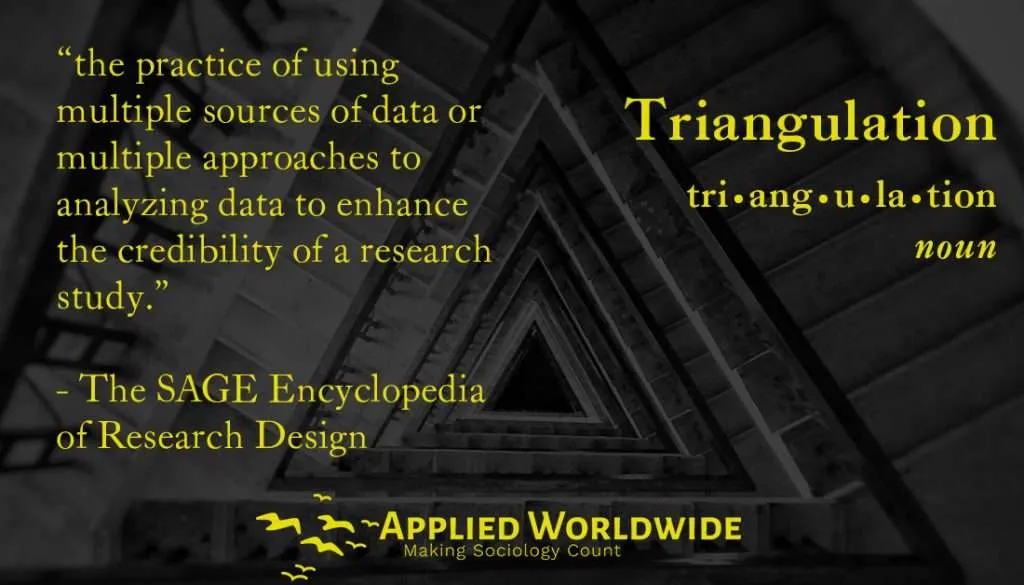
For instance, Emily Milne tells us, “I use qualitative and mixed methods to examine the strengths and needs of, and challenges experienced by, community partner organizations.”
Andrew Cohen elaborates on how he uses a combination of qualitative and quantitative research methods in his work in advertising and brand management.
“Both quantitative and qualitative skills are essential for my practice. Quantitatively, being able to understand and interpret research is important for seeing what kinds of opportunities it might present. It’s also important for me to be able to design my own quantitative research – I have to be able to design effective surveys that give me valid results. Qualitatively, I’m constantly looking at how people talk about and interact with brands and product categories. Knowing how to conduct an ethnographic study and how to look for codes and narratives in interview data is important for finding ways brands can provide more value in consumers’ lives.”
Finally, Cara Margherio writes about her use of diverse research methods.
Although I am a mixed methods sociologist, my passion is qualitative methods. I conduct focus groups, interviews, and participant observations within the different projects I work on. I also design, administer, and analyze a lot of surveys. My training in sociological research methods allows me to design rigorous data collection protocols and ensure the validity of my results.
Surveys and Other Quantitative Methods
With big data, quantitative research methods now require computer skills as well as statistics. You have to know what kind of analysis to perform in order to answer your clients problems, but you also need to know how to write the code to get the statistical analysis software to run the test. These are both valuable skills and in some organizations or industries, positions for sociologists with statistics skills could be amongst the most lucrative applied sociology jobs. As Johanna Bishop says, “Sociologists are trained to be systematic data collectors. We question everything and seek data to support our hypotheses or research questions. We are trained observers and analysts, and skilled in interpreting the data we seek.”
Sociologists with training in the latest statistics could stand to find a profitable career. Healthcare and the technology industry are two domains where there is a demand for quantitative skills. Another domain where understanding statistics is valuable is in the criminal justice system. Jackie Henke speaks on her experience working in criminal justice.
“Much of my job involves identifying and interpreting patterns in data. I design procedures for querying and analyzing data. I produce statistics and visualizations to evaluate performance metrics. I communicate the implications and inferential limitations of data outputs. This process involves operationalizing concepts, identifying measures and indicators, developing hypotheses and model logics, and theorizing about social phenomena. These tasks require a solid understanding of research design, the complementary uses of qualitative and quantitative methods, and research interpretation.”
Dr. Henke does a nice job breaking many of the skills associated with quantitative research. Among those skills I would like to expand on operationalizing concepts and research design. Operationalizing concepts is essentially placing meaning to numbers. It takes a lot of practice to look at numbers and actually understand how they realistically represent people. Relatedly, research design is invaluable. If you can look at a problem and design a research project that can provide a data-driven solution, organizations will pay you.
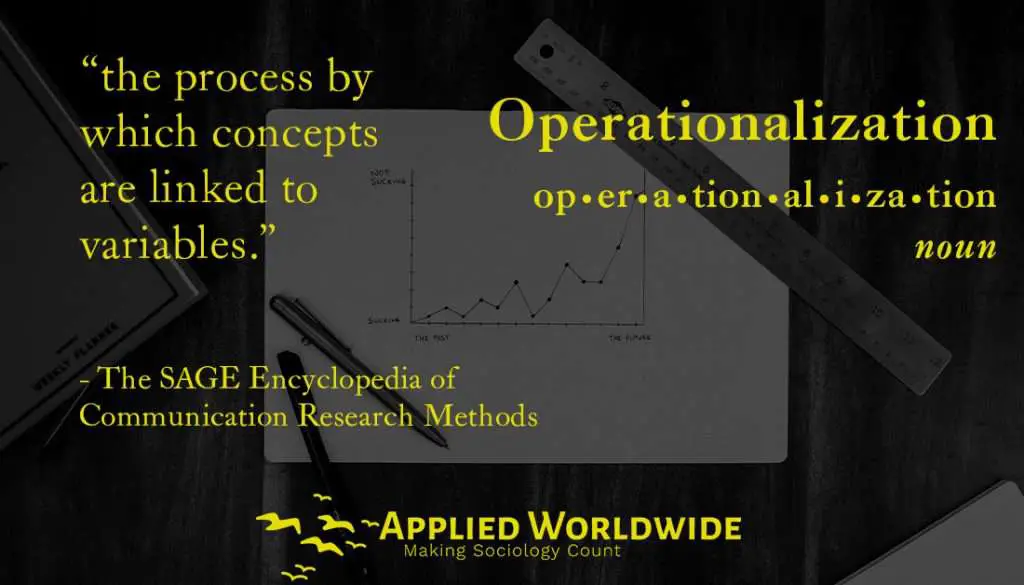
One of the most common quantitative methods is survey research. A lot of people conduct surveys for their businesses or organizations. Pretty much only those who are outsourcing this work are doing it well. Surveys are not easy and it takes experience and practice to get it right.
Ethnography
Ethnography is a qualitative research method that frequently came up in our interviews. Take for instance Anthony Buono who said,
“My background and training in ethnography have been the essence of my work. I have tried to immerse myself in the organizations I study, often in the role of participant observer, using my consulting experiences as field work in my writing. I attempt to be as non-judgmental as possible, trying to understand people’s challenges and behavior on their terms, trying to better understand what they are experiencing.
I then attempt to frame those experiences in ways that add value to their insights. In this sense, Max Weber’s ideal type analysis has been a useful methodological tool in my work, using it for classification and comparison across different situations.”
Another sociologist, Gary David, suggested, “I conduct a lot of qualitative and ethnographic research as part of my work, as well as integrating qualitative and quantitative data.” And, yet another of our sociologists, Miriam Boeri discussed the importance of ethnography.
“I usually use ethnographic methods which involves hanging out in the community I study and with the people I want to know better for research goals. I use mixed methods of data collection which includes in-depth interviews, focus groups, surveys, and an innovative program I developed with colleagues to collect life history trajectories.”
We see several sociologists talk about the significance of ethnography in their applied work. These folks seem to appreciate ethnography for its use in spending time with people and understanding how they operate in order to provide sensible suggestions.
Let’s look at one last quote from an applied sociologist talking about ethnography from Robert Dingwall.
“Mostly I use qualitative methods and I am clear that clients should go elsewhere if they want quantitative research. However, this does not prevent me from commenting on quantitative data. My added value is sometimes in helping clients to understand the social construction of the numbers and how to interpret them. Otherwise, I mainly do interviews and rapid ethnographies.”
The first observation is that Dr. Dingwall is upfront about his work and his qualifications, but he does not discount the value in understanding different methods. Second, Dr. Dingwall mentions rapid ethnography. Rapid ethnography is a practice used by practitioners to cut down on time constraints of using ethnography as a method. Often a small group of researchers collaborate in data collection and analysis to reduce the time investment.
Final Thoughts From Our Question on Research Methods
Research methods are an important set of tools for sociologists. Learning what kind of information a client needs from their consumers and being able to systematically collect and analyze it for them is valuable. Having multiple tools to answer a variety of questions can make a sociologist even more valuable. What makes sociology research methods so valuable though, is our ability to associate data with social meaning, which we are able to do with our knowledge of theory. Melissa Scardaville discusses this point nicely,
“While all social science disciplines offer some degree of methods training, I think sociology is unique in that we are taught to connect theory, methods and data so that each aspect informs the other. In that sense, while I use methods – particularly interviews and qualitative data analysis – constantly, they are never divorced from the theoretical framework of that particular study. It is one thing to devise a powerful interview question. It is another to understand why we are asking it, how it should be asked, and who should be doing the asking.”
What courses should students take in preparation for a career similar to yours?
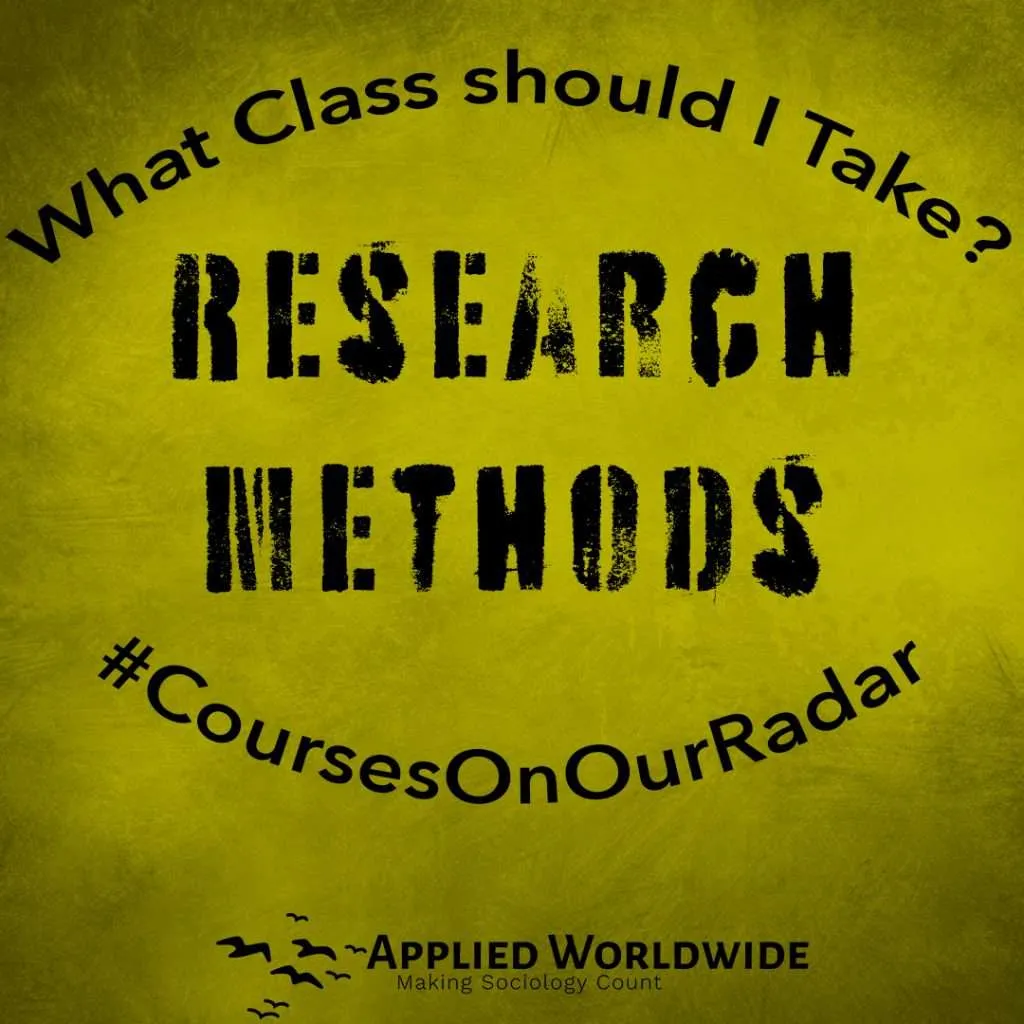
As we previously stated, 32 out of 38 interview participants said they use research methods in their applied sociology careers. A total of 34 participants suggested students should take courses in research methods. That means there were a couple professionals who did not emphasize their own use research methods in their work, but see it as important enough to suggest as a course to take in preparation for an applied sociology career.
In our survey instrument we gave respondents the opportunity to give advice to undergraduate students and graduate students, in separate questions. Therefore, we are able to differentiate between advice for undergraduate students and for graduate students.
Undergraduate Research Methods
Undergraduate research methods are limited in comparison to graduate courses. However, there is still value in the courses that undergraduate students do have access to. Megan Nanney talks about one research methods she had as an undergraduate, “Research methods! It is my research methods class (an introduction to statistics style class) that led me to my first foray into applied sociology. But I also recommend taking both quantitative and qualitative methods–only then can you begin to capture the full picture.”
Undergraduate Students Should take Many Research Methods Classes
We see an emphasis here on taking as many research methods courses as possible. Taking both quantitative and qualitative is a common theme in our interviews.
Cara Margherio suggests undergraduate students take, “Statistics, Qualitative Methods, Sociology of Education, and coursework around gender, race/ethnicity, disability, sexuality, and other aspects of social identities.” To stress the point, Federico Farini says, “Research Methods is pivotal, quantitative and qualitative as well as research design and contemporary GENERAL social theories.”
Applied Sociology Research Methods Courses
Some of the professionals we interviewed suggested students may have opportunities to take applied sociology related research methods courses. For instance Chloe Bird says students should try to take,
“Research methods aimed at conducting various types of data collection and analyses. Writing courses aimed at developing a capacity to communicate in multiple formats in addition to a research paper. Policy courses relevant to government and to policy in the area of research interest such as health care or education.”
Furthermore Karen Albright provides her advice to undergraduate students looking for careers in applied sociology.
“Undergraduates should seek to take as many applied sociology classes as possible—classes that provide a hands-on introduction to the application of sociological concepts, skills and tools.
These should provide the opportunity to actively analyze and engage problems facing a variety of clients and organizations including business, government, and other community agencies and groups, so that students can learn how to utilize an explicitly sociological perspective and related tools to identify, investigate, and actively seek solutions to issues of structure, process and social change.
Internships can be a good opportunity to do some of this work, of course, and those should be taken as much as possible. But actual coursework should also be offered that can facilitate these experiences as well.”
Skills-Based Research Classes
Many sociology departments may not have research methods courses where students get the opportunity to work with community groups or clients. There is still a chance to gain research methods skills that can make you stand out. Melissa Fry talks about specialized courses that undergraduate students can take to gain new methodological tools.
“In addition to traditional sociology courses, I encourage skills courses that expand the researchers toolkit: database management, using Access to build relational databases, Geographic Information Systems, Systems Thinking, and for thinking about how to make your research digestible to diverse public audiences, I encourage a data storytelling or social media campaigns course.”
Finally, Professor Robert Dingwall from the UK talks about his advice for the types of courses undergraduate students should seek in college.
“Students need a diverse range of methods courses. Our professional skill lies in our ability to appraise the value of different kinds of data rather than being locked into the idea that any one kind is superior to any other – it is a question of fitness for purpose. I would also encourage students to think about electives that will give them a wider sense of history and literature to provide a context for their studies in sociology. Students need a good foundation in sociological theory and a sense of the great tradition of the discipline but I don’t think it is a big deal which specific topics they choose to study beyond that.”
Final Thoughts on Suggested Research Classes for Undergraduate Students
Most undergraduate sociology students will not have much choice in the methods courses they can take. The first point of advice from experts is to take whatever methods courses you have access to. Research classes in other departments such as psychology and communication can also be valuable in your applied sociology career.
If you ever have the option to take a research methods class that involves working with the community or with a client partner, then those classes can be the most valuable. These type of courses can even help you secure future employment.
Graduate Student Research Methods
In addition to asking our experts about what courses undergraduate students should take, we asked them their advice for graduate students in sociology. Some of the advice was similar, but a lot of the courses are more specific in graduate school. Overall the three themes we found in the advice to graduate students were diversify methods skills, practice your methods skills, and learn the relationship between methods and theory.
Diversify
The number one piece of advice that professional sociologists had for graduate students was to diversify their repertoire of research methods skills. Janet Mancini Billson makes the point that graduate students should take “All the statistics and methodology courses offered at your institution. They are like the scalpel to a surgeon.” Dr. Billson is not alone in her advice to diversify your research methods portfolio. Karen Albright suggests that, “Methodological prowess is very valuable (and marketable).”
Raeda Anderson gives some additional context for why you should learn as many research methods in graduate school as possible.
“The best advice I received was ‘it is much easier to teach yourself a substantive area than research methods and analysis’. So, I suggest filling your open course requirements with research methods and analysis courses. If you are a quantitative person, take a qualitative class. If you are a qualitative person, take a quantitative class. I promise you that the skills you learn will be invaluable long term.”
The main point all of these folks are making is that it is important to diversify the methods courses you take in graduate school. Course titles can vary greatly depending on your program. With that said, we’ve listed some potential research methods related courses that professionals mentioned below.
General
- Advanced Research Methods
- Research Methodologies
- Research Ethics
- Applied Social Research
- Research Design
- Program Evaluation
Quantitative Specific
- Statistical analysis
- Statistics
- Quantitative Modeling
- Logistic Regression
- Data Visualization
- Computer Languages for Data Analysis (SQL, Stata, VBA, M-language, DAX, and/or R)
Qualitative Specific
- Qualitative Research Methods
- Mixed-Methods Research
- Ethnography and Autoethnography
- Qualitative Research Design
- Introduction to Qualitative Coding
Dissemination of Research
- Public Sociology
- Understanding Research Impact
- Policy and Programmes
- Sociology in Action
Practice
In addition to taking as many research methods courses as possible, sociologists suggested taking any course where you could benefit from putting your methods into practice. In some cases that could be a case of registering for “research credit hours,” as Lauren Gant suggested. Students should network with department faculty looking for independent research opportunities or research assistant opportunities that might translate into credit hours toward your degree.
Other sociologists talked about courses that explicitly aimed at using research methods in applied settings. Mindy Fried mentioned a class called Research Methods in Practice with the objective of teaching students, “how to take sociology out of the classroom and into the nonprofit sector, as well as communities.” Dr. Fried also mentioned having taught a course specifically on evaluation research.
Another sociologist who mentioned community-engaged research methods courses was Emily Milne.
Research methods courses are essential to learn about research design and ethical practices, as well as data collection, analysis/interpretation, and communicating findings. I would also highly recommend that students enroll in courses that offer experiential learning or work integrated learning opportunities that encourage students to get out into the community and gain experience working with community organizations. These courses offer great opportunities to apply academic knowledge to the real-world, build networks, gain experience with critical analysis of complex problems, and learn how to translate academic jargon into accessible language.
Catherine van de Ruit also mentions courses with applied opportunities, but ads a note about the value in interdisciplinary courses. When asked what courses graduate students should take she responded, “Interdisciplinary classes across the social sciences and humanities. Research methods. Opportunities to conduct research in applied settings in partnership with practitioners in the field.”
Once again, we see a sociologist mention the value in practicing the use of research methods in practical settings, but Dr. can de Ruit is not the only respondent to mention interdisciplinary work. Melissa Scardaville says, “Interdisciplinary work is highly valued as an applied sociologist since it is rare that you will only be working with other sociologists.” Finally, Chloe Bird gives us an eloquent response on why graduate students should seek out interdisciplinary research experiences.
“More of the above and if possible an applied course working collectively to assess a problem for a client such as the city or community or a social service organization. Also, consider taking a summer or other position working in a research center at their institution and contributing to work outside of sociology. Understanding their different assumptions and language around research questions, methods, findings, and implications can open your thinking.
Take some courses from the fields that train those whom you are most likely to work with or to whom your work would speak. Look also for courses by sociologists based in other departments or schools within your university such as business, education, medical or other health profession, law, government. Those courses are typically more applied and bring together sociological thinking and a different literature, set of problems and concerns than most courses taught within sociology.”
The main takeaway point here is that if you are a graduate student, you should be taking as many research methods classes as you can. And, if you have the opportunity, professional sociologists say there is a lot of value in taking classes that provide the opportunity apply those skills in the community, particularly if these are interdisciplinary classes.
Are theory classes as important as research methods classes?
As Melissa Scardaville’s quote demonstrated earlier, our ability to connect theory and methods makes us valuable as sociologists. Many of the experts suggested by the time a student is in graduate school, they should be taking courses on theory and methods simultaneously. The most preferred courses are those that emphasize the connection between theory and method.
As Jillian Lane Points out, in many sociology departments this structure may be worked into the program.
“In most sociology graduate programs – half of your required course work is theory and the other half is methodology. So, most graduate programs provide the basis for a career in applied sociology. Policy course work is also advised. I see myself as an applied sociologist who is a generalist because this toolset of methods and theory provide us with tools that can be applied to any given topic or organization. Other disciplines provide similar skill sets – but sociology provides a more broad based skill set, especially in methods, since sociologists tend to use a variety of methodologies (unlike many other disciplines).”
Once again, we see the overall theme that research methods are valuable tools, and they become even more valuable when connected to theory. The relationship between theory and method is what makes our work “sociological.” Theory informs how we use our methods. Think back to Teresa Crew’s quote about using research methods to work with people, rather than conducting research on people. This is a methodological decision based upon a theoretical understanding of power dynamics.
Understanding power dynamics is an important skill in our society, which is why Swakshadip Sarkar says for graduate students to take, “Advanced research methodologies along with more research exposure is very important at this stage. Getting into the depth of gender studies and learning more about intersectionality is also very necessary.”
Final Thoughts on Sociology Research Methods Courses
Here, we’ve shared three highlights from our analysis of professional advice on courses students should take in graduate school. The first was students should take as many classes on diverse research methods as possible. Another was students should seek out courses that require them to use research methods in practical settings. The final takeaway was students should seek courses where they can explicitly explore the connection between theory and method.
I want to end this summary with a quote from Abdulkarim Umar who summarizes our point incredibly well.
“Take sociological courses!
I will indeed recommend that students of sociology take courses such as research, which will enable them to understand problems that need attention and indeed know the appropriate methods of pursuing the problems. It is also necessary for sociology students to take sociological theories which will always serve as guiding principles that will give them direction on what they intend to do. In addition, considering the current trend of things globally particularly as it relates to violence and crime, students of sociology should also take courses in relation to deviance, crime and social change.”
Conclusions on the Value of Sociology Research Methods
The value of sociology research methods beyond the discipline of sociology is grossly overlooked. What our interviews with experts revealed was a narrative that exposed the incredible value of those methods across disciplines and professional settings. As sociologists, we learn to apply our theoretical understandings and methodological skills to a broad scope of settings. Education, healthcare, criminal justice, immigration, war and conflict, and community development are all areas where the things we learn as sociologists are highly applicable and in demand—and that really is just the tip of the ice burg.
So, regardless of where you envision yourself using your sociological tools—be it medicine, policy, or media—know those tools are of value and infinitely critical to the well-being of society.








